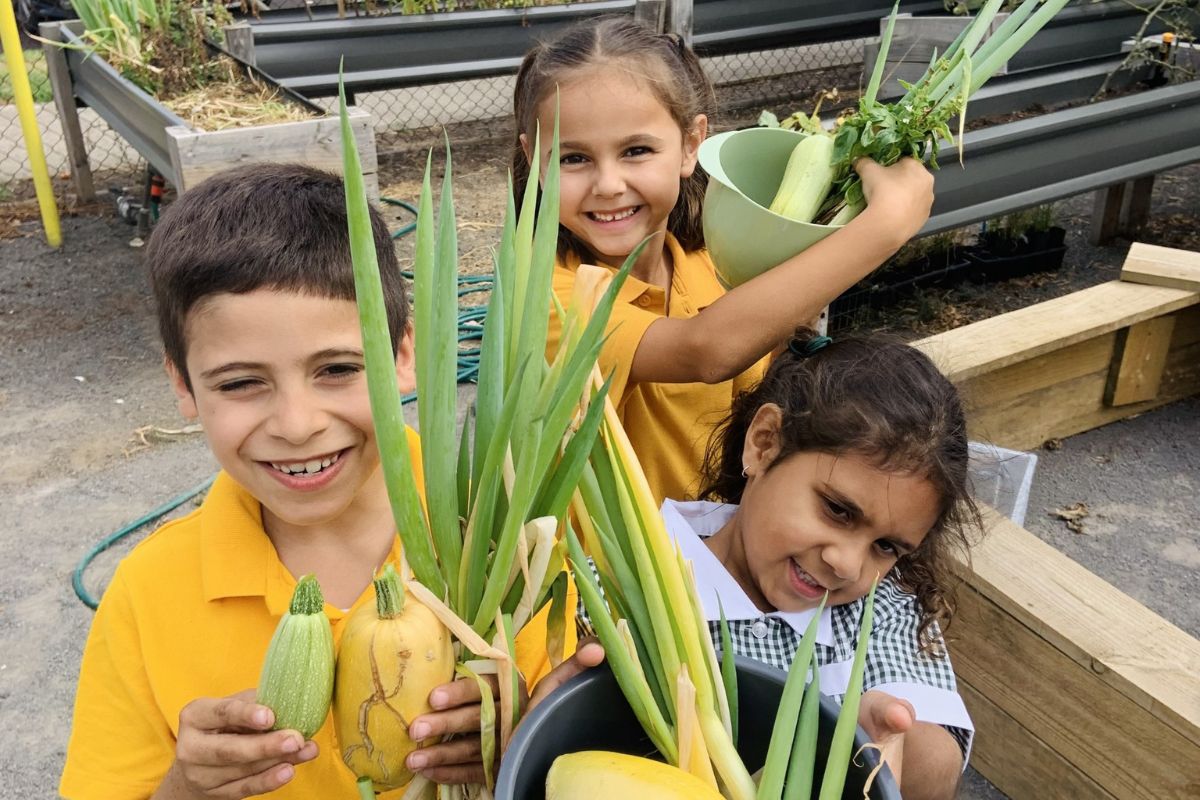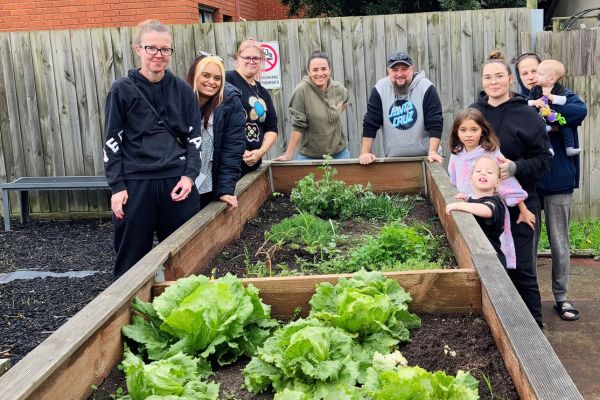Kitchen gardens are strengthening First Nations health

In gardens across Victoria, from Heywood to Gippsland, communities are digging deep into First Nations culture, connection and collective wellbeing thanks to our powerful partnership with the Victorian Aboriginal Community Controlled Health Organisation (VACCHO), and funding from the Lord Mayor’s Charitable Foundation.
At its core, Our Food Connections Project brings together place-based food education and the Culture+Kinship model, developed by VACCHO to restore and nurture connections to Culture, Kinship, Community and Country. Over the last year, four Aboriginal Community Controlled Organisations (ACCOs) have been growing kitchen gardens, delivering culturally relevant food literacy programs, and creating spaces for learning, sharing and healing.
This project is an extension of work begun in 2019 by VACCHO and Deakin University, when food security and nutrition were identified as key priorities. The recommendation was clear: establish kitchen and community gardens to provide culturally grounded food education for Aboriginal children and young people, and their communities.
Drawing on the strength of an existing partnership, VACCHO welcomed the Stephanie Alexander Kitchen Garden Foundation as a trusted implementation partner.

The role of the Foundation and its project lead, Belinda Nowakowski, is to walk alongside and support the delivery of each community’s self-determined priorities. For Belinda, it means anything from having a yarn with Elders and organising donations to weeding and hosting cooking sessions.
Starting with community
Before a single seed is planted, the project begins with an impact yarn. These community consultations allow each ACCO to reflect on its strengths, stories, priorities and knowledge. It’s a process grounded in listening, reciprocity and cultural safety.
Following these initial conversations, each ACCO collaboratively developed a project plan with the Foundation, with clear goals, timelines and roles. When it's time to build the garden, community members of all ages pitch in to plant the first seedlings, from lettuce and tomatoes to Karkalla (pigface) and lemon myrtle.
Here’s a snapshot of some of the impact Our Food Connections project has had on community-led initiatives across the state:
Growing more than vegetables
In Dandenong, the once-forgotten garden beds at the Dandenong and District Aboriginal Co-op (DDACL) were put to good use again. Belinda coordinated generous donations from the Victorian Indigenous Nursery Co-op, a local hardware store and the local council to transform the garden beds.
Mums and their children played a central role in planting and tending the new space. Once harvest time rolled around, they picked their produce and joined Belinda in the kitchen to cook simple, nutritious meals.

“We had a beautiful garden growing, we were able to cook the most delicious meals, we were able to show the younger kids what healthy, nutritious foods look like by getting them involved with peeling or chopping up veggies or helping to harvest items from the garden,” says Maternity Health Worker Naomi Howlett. “They loved it and looked forward to it each week.”
The unfortunate closure of the DDACL buildings hasn't stopped the Mums and Bubs group from connecting. The group has planned a cooking program, with Indigenous ingredients in each dish, at a community centre nearby.
Elders, youth and shared knowledge
Further east, the garden at the Gippsland and East Gippsland Aboriginal Co-op (GEGAC) has become a hub for Elders, staff, and families. Around 15 Elders visit weekly, tending the garden and taking home fresh produce. Any extra veggies are used in food relief programs or enjoyed by staff.

“That’s what’s so nice about this garden,” says Rani Stokell, GEGAC Healthy Lifestyles Worker. “Yes, it’s about soil and plants and growing things, but it’s also about supporting community and coming together.”
Thanks to a donation from the Moogji Aboriginal Council you can find many native plants in the garden, like saltbush, pepperberry and river mint.
A platform for youth empowerment
Meanwhile, in western Victoria, the team at Winda-Mara Aboriginal Corporation is using its community garden as a space for Elders to gather and its after-school programs as a platform for youth empowerment.
Together with the Foundation’s Western District Kitchen Garden Project’s Project Lead Monique Sobey, the Winda-Mara team is working towards creating a vibrant space where bush tucker plants will grow alongside healthy conversations about nutrition and mental health, thanks to donations from Worn Gundidj, Seawinds, and a local Hamilton hardware store.

After-school programs teach First Nations youth aged 13–24 how to cook nourishing meals using ingredients from the garden. Monthly lunches, held in collaboration with a visiting dietitian, bring together community members of all ages to learn about food, health and wellbeing.
“Our Youth have gained essential cooking skills through the healthy cooking activities, allowing them to go home and prepare nutritious and healthy meals for their families,” say Jessica Lovett-Murray and Jenna Bamblett from the Health Service team.
From kinder to clinic
The team at the Bendigo and District Aboriginal Co-op (BDAC) has designed its garden to sit at the heart of community life. Co-located with the kindergarten, medical clinic, Men’s Shed and other wellbeing services, it is already used by children at the kinder, with plans to extend its benefits across all ages and community groups.

Children learn about Indigenous seasons, pick herbs for their cooking sessions, and explore the sensory joys of gardening.
Just getting started
Across all four sites, the emphasis has been on sustainability. While the Foundation supports the initial setup and the delivery of each community’s self-determined priorities, they also support, listen and learn with each ACCO to build the community’s capacity to keep the project thriving long-term.
This includes practical training, sharing adaptable Kitchen Garden Program resources, and encouraging an approach that makes food education part of everyday life.
The success of the project, which has reached more than 500 community members, is a testament to what can happen when communities are supported to lead, when culture is respected as central to health, and when the simple act of growing and sharing food becomes a pathway to healing and hope.
Phase two of Our Food Connections Project is already in the works, with five more ACCOs in the fold.
For more information on Our Food Connections Project, please contact Project Lead Belinda Nowakowski via belinda.nowakowski@kitchengardenfoundation.org.au.
< Back to Latest News
